 Petzlover
Petzlover Havanese is originated from Cuba but Olde English Bulldogge is originated from United States. Havanese may grow 24 cm / 9 inches shorter than Olde English Bulldogge. Havanese may weigh 30 kg / 66 pounds lesser than Olde English Bulldogge. Both Havanese and Olde English Bulldogge has almost same life span. Both Havanese and Olde English Bulldogge has almost same litter size. Havanese requires High Maintenance. But Olde English Bulldogge requires Low Maintenance
Havanese is originated from Cuba but Olde English Bulldogge is originated from United States. Havanese may grow 24 cm / 9 inches shorter than Olde English Bulldogge. Havanese may weigh 30 kg / 66 pounds lesser than Olde English Bulldogge. Both Havanese and Olde English Bulldogge has almost same life span. Both Havanese and Olde English Bulldogge has almost same litter size. Havanese requires High Maintenance. But Olde English Bulldogge requires Low Maintenance
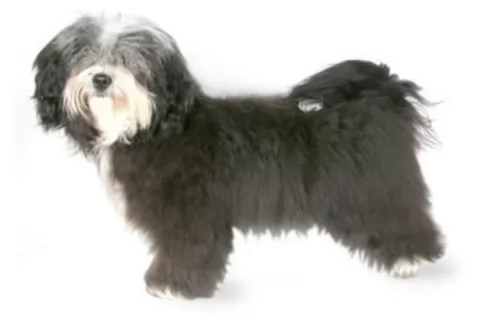 The only breed of dog that is native to Cuba is the Havanese. These little dogs are great companion animals. Sociable and happy, they are very popular in the United States with urbanites. These happy little pups are a Bichon type of dog which was developed from the “Little White Dog of Havana” or the Blanquito de la Habana which is now extinct.
The only breed of dog that is native to Cuba is the Havanese. These little dogs are great companion animals. Sociable and happy, they are very popular in the United States with urbanites. These happy little pups are a Bichon type of dog which was developed from the “Little White Dog of Havana” or the Blanquito de la Habana which is now extinct.
The Blanquito de la Habana was itself developed from another extinct breed the Bichon Tenerife. Then the Blanquito was bred with the other Bichons and poodles in developing the Havanese. It is believed that some of the first people to settle in Cuba were from Tenerife, an island close to Cuba. In the early part of the sixteenth century, little white dogs were brought to Cuba with these settlers. This dog of Tenerife is believed to be the ancestor of all Bichon breeds.
At that time trade with Cuba was highly restricted by the Spanish and so these dogs developed without any crossing from other breeds from outside the country. They grew to be able to stand hot temperatures and they grew a very unique coat – almost like silk. Their coat is soft and light, while insulating them from the tropical environment.
At this time Cuba was the place to be for Europeans aristocrats on vacation. Unlike the British colonies, Cuba had theatres, operas and palacious. When going back to Europe, many took this little white dog with them to France, Spain and England. The Dog of Havannah was a favorite on European soil as well. Many of these dogs taken to Europe were fawn or parti instead of white. Meanwhile back in Cuba, the bourgeoisie were replacing the aristocracy who themselves would soon be replaced by the Revolution.
During the days of the bourgeoisie, the Havanese became very popular household pets. The breed has been a family pet for the last 150 years. At the same time the breed was very trendy in Europe with Charles Dickens and Queen Victoria owning several. They were by now familiar participants in Europe’s dog shows. Finally, with the Revolution, the bourgeoisie left the country in droves with their little white dogs. A genetic pool was then formed in the US. Gene pool from 11 dogs. All the Havanese in the world are descended from those 11 dogs with the exception of the dogs isolated in Cuba and the US. Today the Havanese is one of the most popular and fastest growing breeds in the world.
 The Bulldog in general has undergone quite a few changes over the years and the Olde English Bulldogge was developed as a designer breed in the United States.
The Bulldog in general has undergone quite a few changes over the years and the Olde English Bulldogge was developed as a designer breed in the United States.
The dog was developed by David Leavitt in 1971, who crossed the English Bulldog with a Pitbull, American Bulldog and Bull Mastiff. Leavitt wanted a dog that would be free of the breathing problems bulldogs battle with. He also wanted the dog to be more nimble, more agile and more healthier.
Crossing the Bulldog, Bullmastiff, American Pit Bull Terrier and the American Bulldog, he developed the Olde English Bulldogge. The dog isn’t recognized as a breed by the AKC.
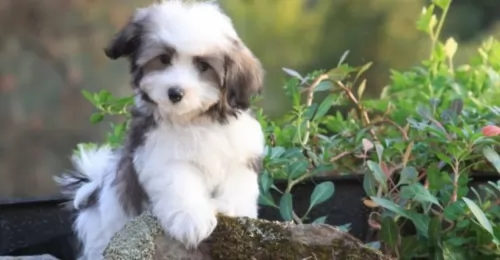 The Havanese is a sturdy little dog, a member of the toy group. They weigh no more than 16 pounds (7.3kg) and his body is longer than it is tall. The breed has a unique topline that is not level, but it is straight. His front legs are longer than his hind legs producing the lively gait everyone is used to seeing with a Havanese. With a full muzzle that tapers to the nose, the Havanese does not seem to be short. The skull’s length is the same as the muzzle’s. The head of the Havanese is round in the back and flat in the front.
The Havanese is a sturdy little dog, a member of the toy group. They weigh no more than 16 pounds (7.3kg) and his body is longer than it is tall. The breed has a unique topline that is not level, but it is straight. His front legs are longer than his hind legs producing the lively gait everyone is used to seeing with a Havanese. With a full muzzle that tapers to the nose, the Havanese does not seem to be short. The skull’s length is the same as the muzzle’s. The head of the Havanese is round in the back and flat in the front.
They have a deep chest, almond shaped eyes that are dark brown and their ears are about halfway down the nose. The long ears hang down the side od the face. They have a long plumed tail that is held high and upward. The standard for the breed and now the laws of the United Kingdom state that there can be no docking of the tail.
 Olde English Bulldogges are purebred dogs. They are big boned, solid and muscular. They are medium sized dogs and stand at roughly between 40 and 51cm and weigh between 22 and 36kg.
Olde English Bulldogges are purebred dogs. They are big boned, solid and muscular. They are medium sized dogs and stand at roughly between 40 and 51cm and weigh between 22 and 36kg.
They have big, broad head and a furrowed face. The ears are fairly small and are semi-erect, semi-floppy. The neck is thick and powerful, the legs short and stocky. The coat is short and is usually white and tan, white and grey, brindle or solid colors of fawn, red and black.
The Olde English Bulldogge is a healthier, more active, athletic dog. It was given this name to differentiate it from the modern English Bulldog.
Olde English Bulldogges are gentle and good natured, snorting around and just dying for his human family to tickle his tummy.
He has an easy-to-please temperament and being intelligent, he will respond well to training and socialization.
He is adaptable and can settle into life in the city or in the countryside. He has strength and stamina but will do better with a walk as opposed to running next to you as you cycle - this will exhaust him and be unhealthy for him.
The Olde English Bulldogge is a sweet, friendly, confident but gentle dog known for his strength and stamina. They are friendly and outgoing, even being social and friendly around strangers. They get on well with children and pets in the home too and will make a wonderful pet.
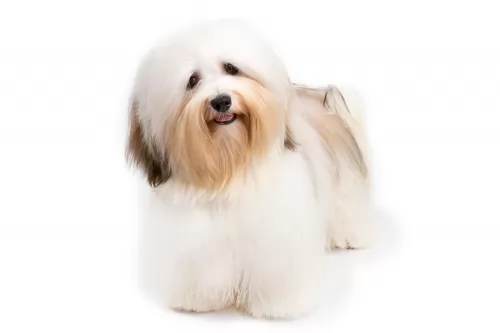 Havanese are highly intelligent and eager to please, and they are easily trained so long as you use only positive methods. This can be a sensitive breed, so care must be taken to not scold them harshly. Socialization from an early age is very important. Expose them calmly to a wide variety of new places and new people, always ensuring that the experiences are positive and not intimidating. Gentle, patient training will result in a wonderful companion dog. They are affectionate with people and get along with other nonaggressive pets.
Havanese are highly intelligent and eager to please, and they are easily trained so long as you use only positive methods. This can be a sensitive breed, so care must be taken to not scold them harshly. Socialization from an early age is very important. Expose them calmly to a wide variety of new places and new people, always ensuring that the experiences are positive and not intimidating. Gentle, patient training will result in a wonderful companion dog. They are affectionate with people and get along with other nonaggressive pets.
The Havanese is the consummate lap dog. Over time they have become the lovable family companion.
The breed is pretty adaptable being able to live as a companion animal in almost any setting. Just don’t expect your Havanese to go hiking or romp with you on 40 acres in the country.
They are intelligent, love to learn but can be a little stubborn. Train them early as they like their habits and its much harder to train an older Havanese.
 The Olde English Bulldogge is a gentle, sweet dog who just wants to be a loved member of your home. He wants to please, so training and socialization will do him the world of good as then he becomes obedient and responds easily to some basic commands.
The Olde English Bulldogge is a gentle, sweet dog who just wants to be a loved member of your home. He wants to please, so training and socialization will do him the world of good as then he becomes obedient and responds easily to some basic commands.
He has a protective nature and will do what he can to guard and protect you. Such a wonderful 4-legged friend and companion deserves your unconditional love.
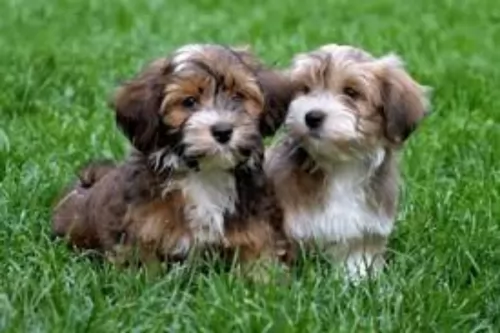 A very healthy breed, the Havanese doesn’t have a lot of health issues, but they are not immune to the problems of small breed dogs. The issues they do have are:
A very healthy breed, the Havanese doesn’t have a lot of health issues, but they are not immune to the problems of small breed dogs. The issues they do have are:
 The Olde English Bulldogge can live to be 14 years old if he is looked after well. These dogs are prone to some of the typical dog ailments there are and bloat is one.
The Olde English Bulldogge can live to be 14 years old if he is looked after well. These dogs are prone to some of the typical dog ailments there are and bloat is one.
This ailment is also known as Gastric Dilatation Volvulus, a life-threatening disease regarded as a medical emergency. The stomach can twist, cutting off blood flow to the heart. It occurs more often in deep-chested dogs and you will notice the swollen stomach.
These dogs are considered to have less health issues than other brachycephalic breeds but still you need to keep an eye on their breathing. In fact, David Leavitt, who developed the dog says that this particular mix of dog doesn’t have the undesired negative health aspects of the dog’s relatives such as hip issues, difficult births and brachycephalic syndrome. They are also far more tolerant to heat and cold that other bulldog types.
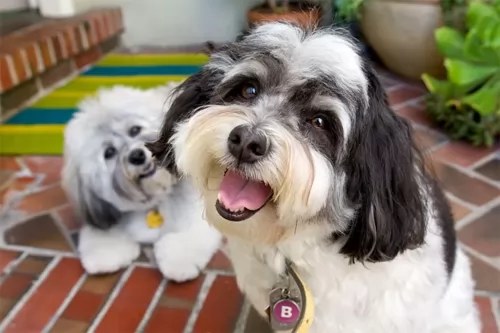 Feed 3 to 4 times per day a high quality dry puppy food for toy or small dogs. Feed ¼ to ½ cup each time.
Feed 3 to 4 times per day a high quality dry puppy food for toy or small dogs. Feed ¼ to ½ cup each time.
Remember these are small dogs and don’t overfeed. Feed a high quality dry food for small or toy dogs. Feed twice a day at about ½ cup each time.
The breed is generally very healthy.
This breed is not an overly active dog, but he does need some exercise. A nice walk once a day or a backyard to play in. They play inside as well as out. Don’t over exercise the Havanese. They do well in obedience and confirmation more so than agility or fly ball
 There are a number of things you can do to make sure your Old English Bulldogge settles down nicely into his new home.
There are a number of things you can do to make sure your Old English Bulldogge settles down nicely into his new home.
With his short coat, he isn’t described as being hypoallergenic, but the coat is looked upon as not triggering allergies as much as some of the other dog breeds. He will simply require a brush twice a week.
Make sure to take your 8 week old puppy to the vet to check him over and to start with his first vaccines to avoid him getting some of the life-threatening illnesses there are. He will also be de-wormed. Later on as an adult, he or she will need to be neutered or spayed to prevent puppies.
Never leave your dog in a car on a hot day. It can kill him. Rather leave him at home.
Feed your Olde English Bulldogge a balanced diet that provides him with the right amount of minerals and vitamins. The top ingredients of commercially manufactured pet food must be meat. You can add some home-made food into his kibble as a treat as well as some raw meat occasionally. Chopped up boiled chicken, brown rice or pasta and vegetables such as spinach, sweet potato and carrots will be excellent for him. You can also look at the possibility of giving your dog a supplement. Make sure he has a constant supply of fresh, cool water.